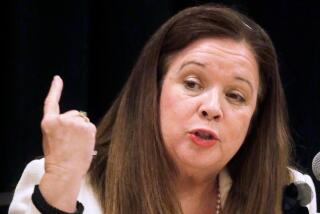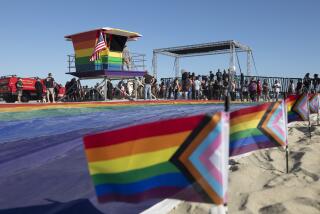Mt. Soledad Cross Champion’s Court Papers Contradict Themselves : Church-state: Discrepancy adds fuel to the battle over constitutionality of public Christian symbols.
- Share via
The president of the group that maintains the Mt. Soledad cross has contradicted himself in separate court affidavits filed under penalty of perjury, a discrepancy that added fuel Thursday to the emotional furor surrounding a suit challenging the legality of the cross.
William J. Kellogg, president of the Mt. Soledad Memorial Assn., filed a first affidavit in October, 1990, indicating that he opposes the suit, brought by two atheist activists, against the 43-foot-high concrete cross standing atop a La Jolla public park. Two weeks ago, Kellogg filed a second sworn statement, saying he was unfamiliar in 1990 with the case.
An attorney for one of the atheist activists, Peter Irons, demanded an “explanation and an apology” for “an outrageous breach of legal ethics by the city’s lawyers.” Kristine L. Wilkes, the city’s lead lawyer, said Irons’ comments were “grossly unfair,” adding, “I really resent the unfounded attack on my ethical qualities and Mr. Kellogg’s.”
Kellogg wrote a letter Thursday about the inconsistency to the federal appellate court now weighing the fate of the cross, telling the U.S. 9th Circuit Court of Appeals that he made an inadvertent slip-up. He said in an interview, “As far as I can see, it doesn’t amount to a hill of beans.”
The focus of the complex appeal has little to do with what Kellogg knew or when he knew it. It centers on a ruling last Dec. 3 by a San Diego federal judge that the cross--and a similar cross in another public park, on Mt. Helix near La Mesa--violate the state Constitution’s ban on mixing church and state.
For the same reason, U.S. District Judge Gordon Thompson Jr. ordered a depiction of the Mt. Helix cross stricken from the city of La Mesa’s official insignia.
The ruling remains prime San Diego talk show and editorial page fodder. Local politicians have condemned Thompson’s ruling. Community groups have staged protests of the ruling at the hilltop crosses, demanding that both be saved. The Mt. Soledad Memorial Assn. has grown from 16 to more than 500 members. Both cities and the county have vowed to wage appeals.
The 9th Circuit Court held oral argument May 5 on the case. Then, in an unusual move, it asked June 23 for more legal briefs on several key issues--among them, whether the Mt. Soledad Memorial Assn. should formally be included in the case.
It currently is not part of the suit. One of the city’s claims on appeal is that Thompson’s ruling improperly neglected the effects of such a decision on the association, a civic group formed in the 1950s to help build and maintain the Mt. Soledad cross.
Kellogg, president of the association, submitted a July 7 affidavit as part of the city of San Diego’s legal brief, filed with the 9th Circuit Court the same day.
In that four-page statement, Kellogg said the association never received formal notice that suit had been filed May 31, 1989, against the Mt. Soledad cross. A lawyer for the city of San Diego “notified (me) informally in early 1991, and in very general terms” about the suit, Kellogg said.
Before Thompson’s Dec. 3, 1991, ruling, Kellogg said, neither he nor the association “were aware that cross-motions for summary judgment had been filed by the parties” or that Thompson held a hearing on those motions.
Summary judgment is a technical legal procedure used, in certain cases, to resolve a suit solely on legal briefs, without the time and expense of a trial. In the Dec. 3, 1991, ruling, Thompson granted summary judgment to the activists challenging the Mt. Soledad and Mt. Helix crosses.
On Oct. 10, 1990--which, according to the second affidavit, would have been months before Kellogg knew about the suit or any motions for summary judgment--he filed the first affidavit, tracing the history of the Mt. Soledad cross in a document titled “Declaration of William Kellogg in support of (the city of San Diego’s) motion for summary judgment.”
“There is a discrepancy,” Kellogg said in an interview Thursday.
In the letter written Thursday to the 9th Circuit Court, Kellogg said he wrote the second affidavit without the benefit of the briefs in the case, since he didn’t have any legal papers at hand. Kellogg, president of the La Jolla Beach and Tennis Club, stressed in the letter that he is not a lawyer and remains unfamiliar with the legal niceties of affidavits.
Relying on his memory, he said in the letter, he thought he had been told about the case in 1991. But, he conceded, it had to have been sometime before Oct. 10, 1990.
“I’m sort of ticked off that they’ve taken the approach I’m trying to mislead the court,” Kellogg said in an interview, referring to lawyers for the coalition of atheist activists and civil libertarians challenging the two hilltop crosses. “That’s not the case at all.”
Irons, one of those lawyers, said his beef was not with Kellogg but with attorneys for the city of San Diego who helped Kellogg prepare the second affidavit.
In a brief filed Monday with the 9th Circuit Court, Irons pointed out the inconsistency between Kellogg’s affidavits and asked the court to impose “appropriate” sanctions on the city of San Diego’s attorneys. The rules of legal ethics forbid a lawyer from knowingly presenting false statements to a court.
“This may simply be the result of incredibly sloppy work by the city’s lawyers,” Irons said. “Or it may be a deliberate effort to mislead and deceive the court of appeals. It will be up to the court to decide whether to investigate and what action to take.”
Wilkes said no investigation nor action would be warranted. She said she had reviewed the July 7 affidavit before filing it with the city of San Diego’s legal brief, but didn’t catch what she called a “minor, immaterial discrepancy.”
Kellogg “was remembering, as best as he could, something that happened two years ago,” Wilkes said. “This whole thing is not surprising. They couldn’t respond to the city’s legal arguments on the merits, so here they are, mounting personal attacks on me and Mr. Kellogg. I think it’s unfortunate.”
It could be weeks or months before the 9th Circuit Court decides whether to impose sanctions or issues an overall ruling in the case. More briefs are due to be filed next week.
More to Read
Sign up for Essential California
The most important California stories and recommendations in your inbox every morning.
You may occasionally receive promotional content from the Los Angeles Times.












